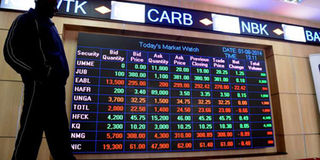The year 2017 will be one for capital markets

The Nairobi Securities Exchange. PHOTO | SALATON NJAU | NATION MEDIA GROUP
What you need to know:
After several false starts, the Nairobi Securities Exchange (NSE) may launch a futures exchange.
The NSE is expected to be more vibrant.
The efforts to enhance local markets are valuable and have placed the sector in a pivotal position in actualising the Vision 2030 initiative and transforming the financial sector.
However, more needs to be done to create capital market awareness.
The year 2017 will be one for capital markets in Kenya if the array of products and innovations the Capital Markets Authority and other stakeholders have scheduled receive uptake.
After several false starts, the Nairobi Securities Exchange (NSE) may launch a futures exchange. The NSE is expected to be more vibrant.
A commodities exchange might also be set up. The Finance Act 2016 amended the Capital Markets Act to provide the legal requirements. Equally, the Mining Act 2016 requires the setting up of such an exchange. Efforts to set up the exchange will be boosted if the Warehousing Receipt Bill, currently before Parliament, is passed. The East African Community set December 2016 as the date for partner states to establish their national commodities exchanges, which Kenya has not fulfilled.
The country will see the inaugural issuance of a green bond, a debt instrument to raise capital for environment-friendly projects. The Kenya Bankers Association and the NSE have set February next year as the expected date for the issue. Green bonds have gained prominence worldwide, especially in combating climate change. The NSE plans to set up a platform to facilitate trading in carbon credits.
The year 2016 witnessed an extended bear run at the NSE. The market did not recover even after the scrapping of the capital gains tax. The percentage of shares traded (turnover ratio) was less than five per cent. These low liquidity issues may be addressed by two reforms:
LISTING RULES
One, the issuance of exchange-traded funds (ETF), being an index or basket composed of securities, commodities, derivatives, or a combination of real assets, traded at the exchange. The ETF Policy Guidance Note has been enacted and NSE has amended its listing rules to incorporate the funds.
Second is the introduction of the securities lending and short selling framework. Securities lending will enable investors to transfer securities temporarily to a third party to engage in market marking and trading activities such as hedging and short selling. Short sellers will increase the trading activities and make the market more vibrant.
If the National Treasury finally issues the M-Akiba bonds, they will offer ordinary Kenyans an avenue to participate in the government securities auction. The proposal to offer M-Akiba bonds in low denominations of Sh3,000 will encourage their uptake. This will introduce many citizens to the debt capital markets and boost national savings. The Treasury has also indicated its intention to tap Islamic capital markets by floating a sovereign Sukuk al Ijara, a “bond” that complies with Islamic finance principles.
Companies listed in foreign exchanges will be able to offer their securities to Kenyans without listing at the exchange. This will be through the global depository receipts and notes framework, which the Capital Markets Authority has drafted a policy guidance note to facilitate. This will enable Kenyans to hold shares and bonds in companies listed in other countries.
REGULATIONS ENACTED
Asset-backed securities (ABS) may receive uptake. The regulations for the securities were enacted in 2007 but unclear provisions such as tax treatment and nature of transfer of assets to a special purpose vehicle hindered their uptake. The authority recently clarified some of these issues. ABS, being tradable financial securities created through a securitisation transaction, will be valuable products, especially in facilitating funding, say for county governments.
The corporate governance practices on issuers of securities to the public will be significantly enhanced after the Code of Corporate Governance and the Stewardship Code for Institutional Investors takes root. These codes are aimed at encouraging responsible management. Further, auditing of listed companies will be more thorough after the Capital Markets Authority directed the application of International Audit Standard No 701, which requires auditors to highlight key audit matters.
Technological innovations such as artificial intelligence, Blockchain, and the Internet are evolving and will restructure markets. The authority plans to establish a regulatory sandbox programme to create “safe places” for innovations without necessarily triggering regulatory sanctions, hence facilitating the introduction of products such as crowd funding and peer-to-peer lending.
The efforts to enhance local markets are valuable and have placed the sector in a pivotal position in actualising the Vision 2030 initiative and transforming the financial sector. However, more needs to be done to create capital market awareness.
Gatuyu Justice is advocate, High Court.
@gatuyu




